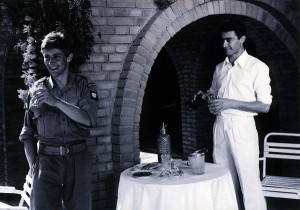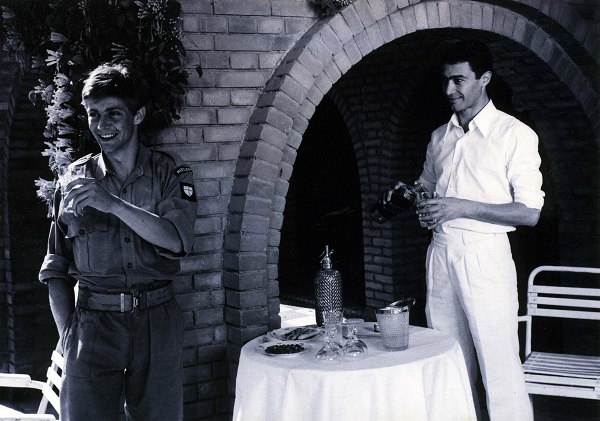By Malu Halasa,
Safar’s Writer in Residence
Alexandra, Why? (Iskanderiya… leh?) won the Silver Bear Special Jury Prize at the 1978 Berlin Film Festival and for good reason.
ALEXANDRIA, WHY?
Dir: Youssef Chahine
1978 | Egypt

Alexandra, Why? (Iskanderiya… leh?) won the Silver Bear Special Jury Prize at the 1978 Berlin Film Festival and for good reason. Its greatest strength lies in that it reveals a history not readily known in the West – the entwining of the anti-colonial struggle in Egypt with anti-Allied sentiment during World War II; Communism and the great workers’ strikes; and the war that enveloped Egyptian Jews who sought refuge in Palestine. However, it is Alexandria itself that amazes. Egypt’s second city was filled with myriad intrigues, identities and nationalities. It is this cosmopolitanism that gives the movie its contemporary sweep, from star-stuck ambition to gay tenderness, and provides the basis for the first of four films Youssef Chahine (b. 1926) would make about the city of his birth.
Yet when Alexandria, Why? debuted in the United States, veteran New York Times film critic Vincent Canby suggested that the inclusion of a love affair between a wealthy Jewish woman (Naglaa Fathy) and a Muslim man (Ahmed Zaki) might seem “avant garde” in Egypt but not in the rest of the world. In the intervening 33 years since the film was made, easy-going tolerance and secularism have become rarer still. Certain relationships depicted in Chahine’s sprawling epic, set on the eve of the German invasion of Egypt in 1942, don’t appear that often on the big screen in many Middle Eastern countries. The director’s independence and pushing the boundaries in many of his movies meant they were often banned in Egypt, likeAlexandria, Why? was when it was first released. Since then the film has become a classic of Arab cinema.
Like War and Peace, the themes of Alexandria, Why? are grand. The dominant one concerns the director’s alter ego, Yehia (Mohsen Mohieddin), a young man enamored with Hollywood films. He is a student in Egypt’s first secular school, based on the real life Victoria College, which produced both the director and the star Michel Shalhoub (better known as Omar Sharif) who Chahine is credited with giving his first break – although the story goes that he discovered him in a café à la Lana Turner. While performing Shakespeare and trying to put on grand musicals don’t exactly prepare the film’s young protagonist for the cold reality of the slow dissolution of his family’s fortunes, against the odds, creative talent does will out and follows a path similar to the director’s own. Where the silver screen departs from reality was that Chahine had already been planning to become an actor at the stage school of the legendary Pasadena Playhouse. Once he didn’t see anyone who looked like him – admittedly there were few Arab leading men making it in 1940s Hollywood – he turned to directing instead.
Punctuating Alexandria, Why? is documentary archival footage of World War II, which also provides a convenient backdrop for espionage in the film. Egyptian agent provocateurs learning that Churchill was going to pay a surprise visit to Allied troops – which he really did in 1942 – try to get the Germans to assassinate the British prime minister. However it is another unexpected and understated love affair, which makes the film such an impressive precursor to the much acclaimed The Yacoubian Building directed by Marwan Hamed in 2006. The subtle exploration of gay themes inAlexandria, Why? was another surprise, no doubt, for US critics who expected only an Egypt mired in official conservatism.
Chahine passed away in 2008. Although he had been making films in Egypt for over fifty years he remained attached to the city he loved. When asked about his work, he was adamant: “I make my films first for myself. Then for my family. Then for Alexandria. Then for Egypt.” In Alexandria, Why?, his priorities were spot on.
Alexandria, Why? will be screening as part of Safar: A Journey Through Popular Arab Cinema at the Institute of Contemporary Arts on Sunday 23 September 2012 at 6pm.
About Malu Halasa
We are delighted that London-based journalist, writer and editor, Malu Halasa will serve as a writer-in-residence for Safar: A Journey Through Popular Arab Cinema. Malu will be blogging daily at www.arabbritishcentre.org.uk and www.ica.org.uk.
Malu is a leading expert in her field, having edited books such as Kaveh Golestan: Recording the Truth in Iran (2007) and The Secret Life of Syrian Lingerie (2008). She is also Series Editor of Transit, an occasional book series showcasing new writing and images from the Middle East, including Transit Beirut (2004) and Transit Tehran: Young Iran and Its Inspirations (2010). Former Managing Editor of the Prince Claus Fund Library, she was a founding editor of Tank magazine. She is editor-at-large for Portal 9: Stories and Critical Writing about the City, a new architectural biannual from Beirut. Most recently, Malu co-curated Culture in Defiance (2012) at the Prince Claus Fund Gallery – an exhibition that considered traditions of satire, art and the struggle for freedom in Syria.

